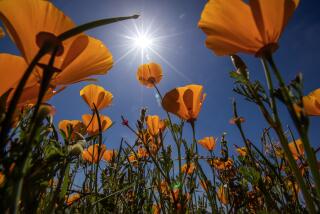On the Bad Timing Scale of 1 to 10, This Was an 11
- Share via
SUN VALLEY — Talk about timing.
When the folks at the Theodore Payne Foundation picked Feb. 6 to launch their annual winter sale of drought-resistant plants, how could they have known that one of the season’s meanest El Nino storms would strike the very same day?
“It’s windy, it’s cold and it’s wet,” said Michael Kristiansen, the foundation’s executive director. “Nobody’s going to come out on a day like this.”
Kristiansen was close but not totally accurate in his prediction Friday morning. By noon, customer Florence Shotts had arrived at the front door of the region’s drought-tolerant mecca in search of blue and white California lilacs, poppies and other flowers and shrubs.
“I couldn’t come tomorrow and I couldn’t come Sunday, plus I’ve been planning for weeks to hit the sale,” said Shotts as she stood in the pouring rain trying to explain what exactly compelled her to confront the elements head on and make the hour-plus drive from her San Bernardino County home.
“The ground is soaking wet and the parking lot is a mess,” Dustin Alcala, the foundation’s nursery manager, explained to a potential customer over the phone. “It’s really bad out here today.”
Since Shotts turned out to be one of only a handful of customers willing to brave the rain for the drought, foundation officials decided to extend the weekend-long sale through Feb. 15.
The foundation was established in 1960 by friends of English-born botanist Theodore Payne to educate the public about the conservation and horticulture of native plants. Its annual sale features more than 400 varieties of native plants and seeds, most of which need little to no water to survive California’s normally dry conditions.
The plants are located in the foundation’s adjacent nursery, and the seeds, including 13 seed mixtures created by Payne himself, can be purchased at the foundation’s gift shop, which also has books on animals and plants.
Although Friday’s downpour may have been excessive, Kristiansen explained that the foundation’s wildflowers and succulents will use moisture to begin growing again.
“When it’s totally dry, they don’t die but they don’t grow either,” Kristiansen said. “They have the ability to seal themselves off and just sit there, similar to a bear hibernating in the winter.”
When a period of moisture is followed by a period of heat, Kristiansen continued, the plants begin growing again.
“When we have weather like this, plants are growing like gangbusters,” he said. “It’s promising to be a very bright spring.”
The foundation is open Wednesday through Sunday from 8:30 a.m. to 4:30 p.m. and is located at 10459 Tuxford St. in Sun Valley. For more information, call (818) 768-1802.






